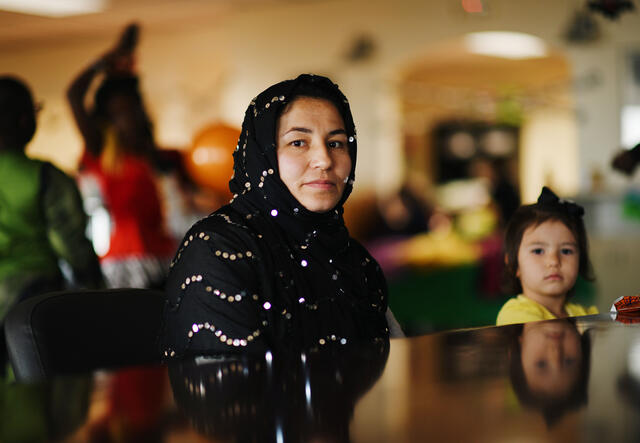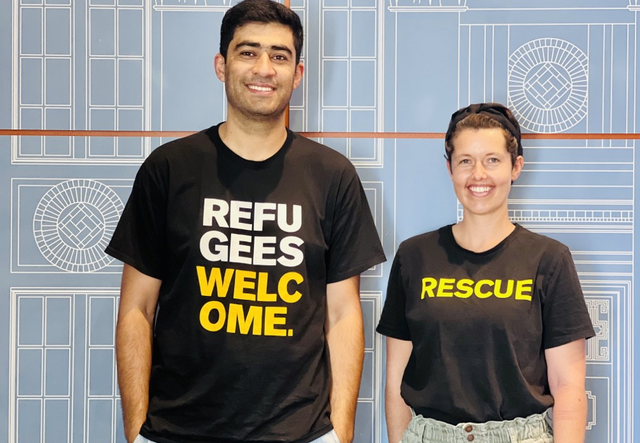#MentalHealthAwarenessMonth
What comes to mind when you think about Mental Health? While there is still a stigma associated with it, much progress has been made that is worth noting. From the shift we see in how this subject is portrayed in movies and T.V. shows, the books we read, to the conversations we have with our loved ones – the change is noticeable.

A need for psychosocial support
The IRC (International Rescue Committee) in Phoenix received an increased number of Afghan refugees beginning in August of 2021, after the Taliban regained control of the region. In response to that, we were one of eight RAI (Resettlement, Asylum & Integration) offices who were granted funding to launch a new wellness program, Salamati Rohi (Spiritual Wellness), to support our Afghan clients.
Wen Chien Lin, who oversees the Therapeutic Services program as a Clinical Manager, provides a breakdown of her team and what they are responsible for.
- Clinicians: provide therapy for clients and have the necessary qualifications to diagnose them.
- Mental Health Coordinators: assist with external referrals, build partnerships, do community outreach and advocacy.
- Mental Health Specialists: Life coaches who offer psychosocial support for Afghan clients through the Salamati Rohi program.
“[Mental Health Specialists] are, at an entry level, providing integration support. And in that process, sometimes, specialists can identify people who need more specialized support,” Wen shared.

Salamati Rohi Program
This program aims to support Afghans, who were forced to flee their home country, through one-on-one discussions, interactive activities, and useful skills that they can apply in their daily lives – promoting wellness of their body, mind, and spirit. In April of last year, two Mental Health Specialists, Marli and Shahanshah, were hired before the rollout of this new program in Phoenix. They each bring a unique perspective and approach to their role that has helped establish trust between them and the clients they serve.
Marli worked as a caseworker for Afghan clients prior to accepting this role where she tracked information, filled out paperwork, and connected clients to services – focusing on their basic needs first. The transition to a Mental Health Specialist was different as there was no set agenda, no checklist when working with her clients – allowing her to dedicate her full attention to her clients’ psychological well-being. “Our approach is incredible in the way it’s very client centered,” Marli expressed.
Shahanshah fled Afghanistan in August of 2021, and arrived in Phoenix in October that same year. He began working at the IRC in April of 2022. “As a [former] refugee, I wanted to continue to help refugees – I can explain to clients how to navigate through some of the challenges they are experiencing,” he said.
Before they could start working with clients, they went through an extensive amount of training to prepare themselves. “We have a lot of training in mental health cases, trauma training, anti-trafficking training and more,” Shahanshah said. One of the challenges that arose during the planning process was determining how they would present the program to Afghan clients in a way that would normalize talking about what they are feeling and why.
“It was great that we had Shahanshah coming from an Afghan background knowing the ins and outs of the culture and how to navigate that and also to draw from our backgrounds of providing mental health services to our clients and knowing how to navigate those conversations,” Wen added.

Life Skills
The following life skills are taught to clients within this program:
- Re-building healthy social connections
- Develop problem-solving skills
- Promote positive activities
- Promote helpful thinking
- Managing reactions
By learning these skills through the coaching of our Mental Health Specialists, the goal is for Afghan clients to cope with what they are feeling and experiencing in healthy ways, manage difficult thoughts, and help work through current problems.
For this to be effective, it takes a lot of patience, understanding and effort on both sides. “I’ve had many clients who have had that resistance, and it was hard for me. It’s hard to deal with that type of resistance, but you have to accept it and switch tactics,” Marli recalled.
Sometimes, it may take a change in location and soothing activities to help move conversations forward in a way that does not feel forced. From kicking the soccer ball around at a park to knitting together, Shahanshah and Marli incorporate healthy, positive activities within their client sessions to build strong relationships.
Shahanshah finds himself able to relate and empathize with his clients as they have shared experiences of leaving Afghanistan. “A lot of clients want to accept but can’t because the language and culture is different and because of that they run into challenges that affect their mental health,” he said.
Self-care
It is almost impossible to not get attached to the clients we work with as we want the best for them, which is why it is so important to take care of ourselves so that we can give our 100% during those interactions. “We care, you get invested – when someone is vulnerable with you, that’s a legitimate connection you are building with someone,” Marli said.
Both Marli and Shahanshah are not alone – they can always rely on their team for extra support when they need to talk through problems. They also actively work on setting boundaries and taking care of their needs outside of work.
What does progress look like?
Progress takes many forms. First, is the trust that is developed over time through weekly one-on-one sessions. “The breakthrough happens when [clients] begin to trust me…that’s a breakthrough, because you can be vulnerable now with me,” Marli explained.
There have also been moments where, “The client realizes they have control of their thoughts and emotions. Some of them can express that, which is a huge improvement. It is about the client taking back control,” she added.
An important part in tracking success is client enrollment and feedback. One of their clients discussed a technique that helped her manage her anxiety. She said, “I practiced my breathing techniques everyday as I find it useful when I am feeling stressed.” When asked if they would recommend this program to others, she said, “yes, because they will be able to learn techniques that will help them, and they will feel supported every step of the way.”
With feedback like this and the progress that has been made, the team realizes the need for this program to continue and to hopefully expand to provide services to clients from other countries. “It’s obvious that the clients feel seen and are finally being able to talk about what they have been through, not necessarily trauma but the resettlement stressors – it’s supporting clients in a different way,” Wen shared.
In the past year, the team has made a strong effort to, “build that social connection with the community through social therapeutic activities, to create a sense of community and not feeling alone,” Wen added. They have coordinated a Halloween party, a visit to the Botanical Garden, an educational session around services for those who have special needs, and a day at the children’s museum!
So far, the Salamati Rohi program has served over 50 clients. Here is to keeping these important conversations going. #MentalHealthMatters
